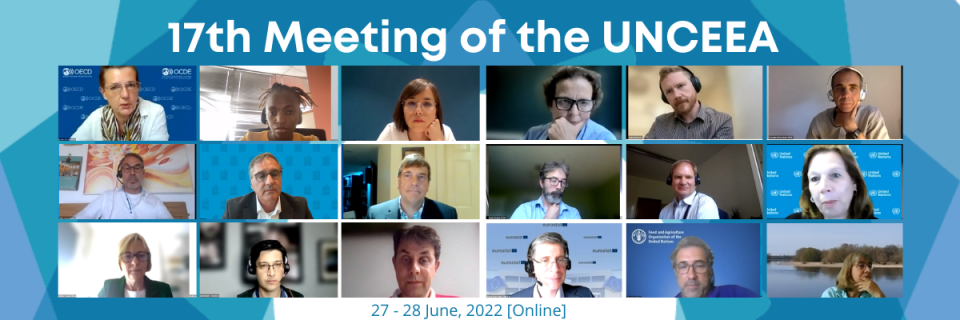The 17th Meeting of the UNCEEA

The Seventeenth Meeting of the UN Committee of Experts on Environmental-Economic Accounting (UNCEEA) took place virtually on 27-28 June 2022. More than 70 participants from national statistical offices and international organizations took part in the annual meeting. The Committee, currently chaired by Bert Kroese, Deputy Director General of Statistics Netherlands, provides the overall vision, coordination, prioritization and direction in the field of environmental-economic accounting and supporting statistics. The Committee discussed activities for each of its work streams, including coordination and communication, methodology, data, capacity building and business accounting.
In terms of methodology, the Committee discussed both the SEEA Central Framework (SEEA CF) and the SEEA EA. The session on the SEEA CF largely focused on the Committee’s active engagement in the updates of international classifications, including the International Standard Industrial Classification of all Economic Activities (ISIC) and the Central Product Classification (CPC), as well as its future engagement in the upcoming updates of the Standard International Energy Product Classification (SIEC) and Classification of the Functions of Government (COFOG). Participation in these updates will help ensure that the updated international classifications can facilitate SEEA compilation and can respond to environmental policy demands. In addition, the Committee remains committed to actively engaging in the update of the 2008 SNA, with a view towards enforcing the strong linkages between the two systems to address issues on environmental sustainability for the SNA.
For the SEEA EA, the Committee’s focus has shifted towards implementation. The SEEA EA Technical Committee presented its progress over the past year, in particular that of two working groups under the Technical Committee on forest ecosystem and oceans. The Committee also discussed areas of future focus, including links between ecosystem condition and service accounts, accounting for urban areas and other topics on the research agenda.
In terms of coordination and communication, members stressed the importance of continuing to mainstream the SEEA in areas such as biodiversity, circular economy and climate change. In addition, the Committee also received an in-depth update on the monitoring framework of the post-2020 Global Biodiversity Framework (GBF). The SEEA is expected to provide the underlying methodological framework for relevant headline indicators of the monitoring framework. In December, the COP-15 will be held in Montreal, Canada, and an expert group is being proposed to oversee the development of metadata for indicators of the monitoring framework. The Committee noted the importance of UNCEEA members participating in this expert group, as well as closer engagement between national statistical offices and CBD focal points.
For data, the Committee discussed the progress made on the priority datasets of air emissions, energy, land, material flow and water and highlighted areas of improvement in terms of coverage and timeliness of data (e.g. quarterly air emission accounts). The working group on data has made good progress over the last year in terms of data collection, with UNEP beginning global data collection for material flow accounts, and UNSD and OECD creating global data collection templates for energy and air emission accounts, respectively. It is expected that global data collection for air emissions and energy will begin later this year or early next. In addition, it is anticipated that the data collection templates for energy and air emission accounts will also be used for the new G20 Data Gaps Initiative (DGI).
